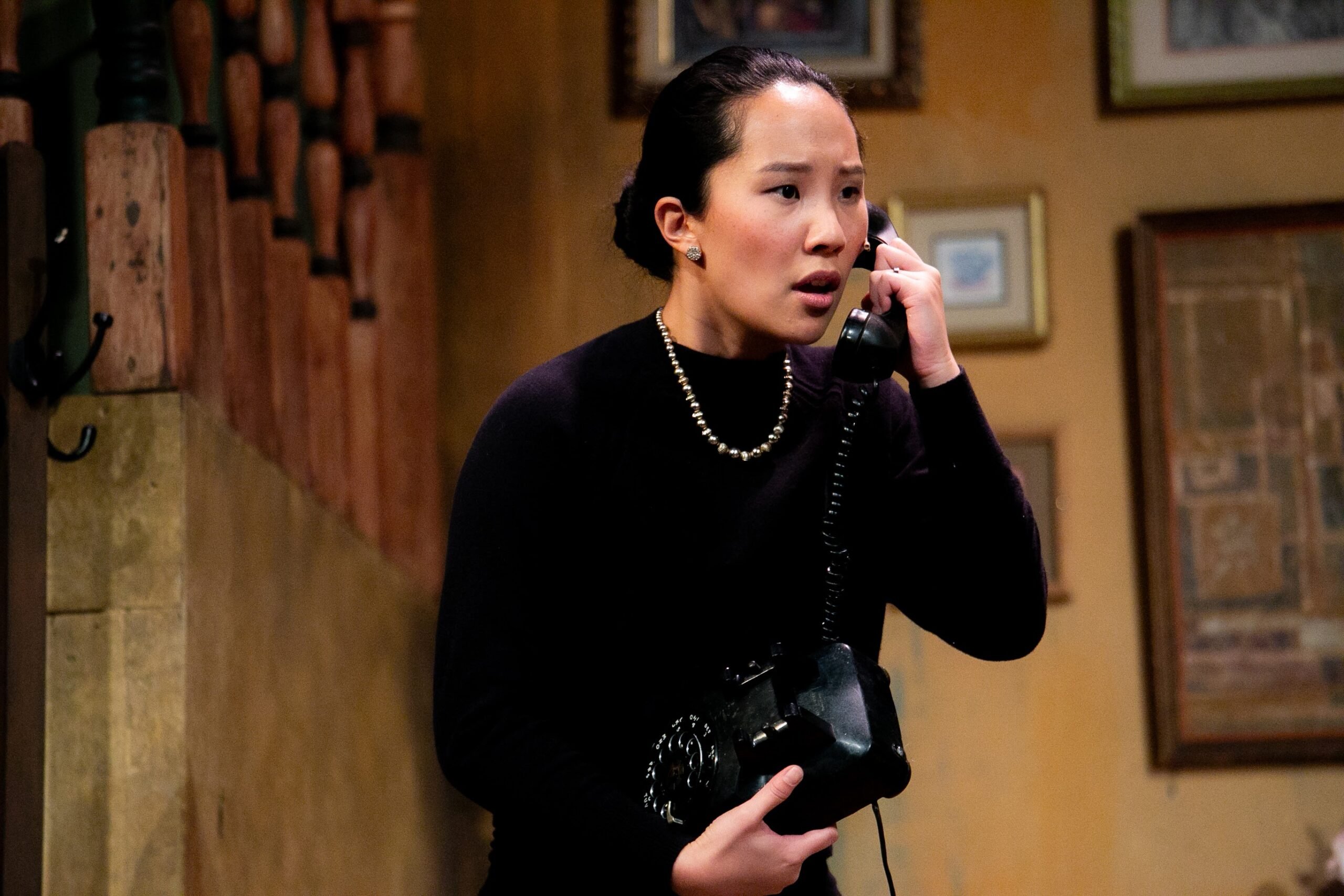Georgia Ensemble Theatre will introduce itself to its new Marietta audience with abundant tension and chills on Halloween weekend, opening its first season at Jennie T. Anderson Theatre with the claustrophobic thriller Wait Until Dark.
The Frederick Knott play about a blind woman terrorized in a basement apartment by home invaders seeking smuggled diamonds, adapted by Jeffrey Hatcher, will run through November 5.
Actress Michelle Pokopac, playing Susan Hendrix — a role previously played onstage by Lee Remick and onscreen by Audrey Hepburn — said in a recent interview that she is excited for audiences to catch the show.
“I love thrillers and scary shows that are live, versus a movie,” she said. “There is nothing like it. You can slice through the tension in the air with that live energy. I cannot wait to experience that.”
Co-directors Candy McLellan and Jeremiah Davison said one of their biggest

challenges in the staging was to create a feeling of too-close-for-comfort tension at the Jennie T. Anderson.
“It’s quite intimate,” McLellan said. “It’s kind of cool because it looks intimate, even though it’s in the gigantic space that is Jennie T . . . it feels very fresh, new and exciting.”
Davison said the basement apartment set by Alexander Whittenberg and lighting design by Rachael Blackwell give the show a cinematic feel that audiences will appreciate.
McLellan, who recently appeared in Theatrical Outfit’s Passing Strange as a performer, said final rehearsals revealed to her just how intense the show she and Davison have crafted is.
“When I saw the run during tech rehearsals, the ending scene was terrifying,” she said. “I was like, ‘Oh my God!”’
Davison, who has a background in design, said setting the show during the 1970s — an update from the original script — gives it a distinct look and feel.
Davison and McLellan, who are engaged to be married, said their complementary backgrounds helped them lead the show with their strengths.
“I feel like I have a language that I can articulate easier with actors, at least I hope so,” McLellan said. “I can put myself in their shoes and give them things that they need.”
“While as a designer, it’s really helped me to see the show in a way that’s big before it happens,” Davison said. “That’s always a good thing. I’m able to communicate with other designers clearly, using their language.”
“Which I always struggle with,” McLellan added.
“It’s this great dynamic,” Davison said. “Since it’s such a technical show, even in rehearsals, I have been able to help communicate to the actors what a moment means and how it translates onstage.”

Davison said the unique elements of Wait Until Dark will also engage all of the audience’s senses, emphasizing moments with sound and smell. They do get to witness a touch, if not feel it.
“We won’t get taste,” he said. “Unless they get a drink at the bar.”
Pokopac said this is her first time working with co-directors, but she has loved the process.
“The biggest thing with directing is executing one vision: You’re carrying that one vision for the whole team,” Pokopac said. “Oh my gosh, I feel like they are truly thinking on one mind, the same page.”
She added, “They have the jargon and the point of view of the cast and ensemble onstage. And they have the ability to look at it with a wider lens, how that’s executed and how to communicate that to designers.”
For Pokopac, playing a visually impaired character as a sighted actress is, of course, the biggest challenge.
“You know, I want to make sure that I’m not just doing things randomly,” she said. “I’m trying to be as authentic and respectful as possible. You have these four other wonderful senses that you really need to hang onto, emphasize and develop more. It’s tricky, too, because I’m not wearing glasses or anything that would be in the way of my actual vision. It’s a balance of that body consciousness and being able to navigate the space, being able to learn how to respond to things differently, a lot more with hearing and tactile touch. I’m trying to understand what you lean with first.”
She said this role requires utilization of everything she has learned as an actress.
“With acting in general, when it comes to body energies, people tend to lean on that technique of what leads the character. Is it through the head, through a certain energy or speed?” she asked. “Impediment work is already implemented in acting. I thought it was really cool to add to it, not just technique-wise but physically and emotionally.”

To assure she tackled the role with authenticity and sensitivity, Pokopac also consulted with Center for the Visually Impaired, which invited her to meet people with varying degrees of visual impairment, including those who have full opaqueness, people who were born without sight and people — like her character Susan — who have lost their sight over time.
Susan’s blindness is one of her greatest strengths, as the play shows through delicious plot twists.
“What is it about Susan or the story that intrigues us?” Davison asked. “I want to share with our audience the strength of a person — no matter their constraints, abilities or what they’re facing. Don’t perceive people as weak, judge or label them based on their disability or gender. This story is ultimately about the perseverance and heart of this woman to survive, given the circumstances.”
::
Benjamin Carr, a member of the American Theatre Critics Association, is an arts journalist and critic who has contributed to ArtsATL since 2019. His plays have been produced at the Vineyard Theatre in Manhattan as part of the Samuel French Off-Off Broadway Short Play Festival and at the Center for Puppetry Arts. His novel, Impacted, was published by The Story Plant in 2021.

